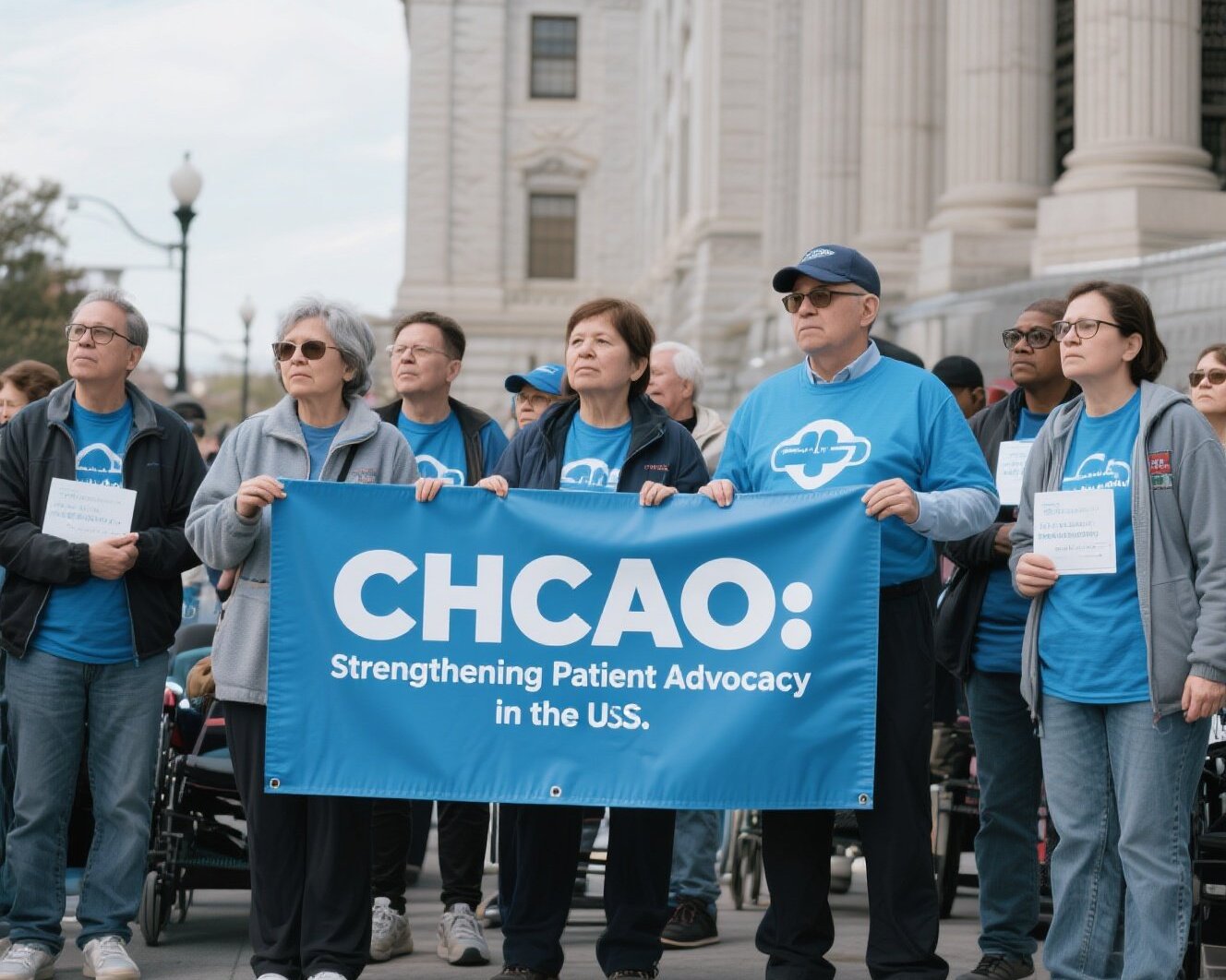1. Introduction
The U.S. healthcare system is often described as one of the most advanced yet one of the most complex in the world. From navigating private insurance plans to dealing with unexpected medical bills and fragmented care systems, patients frequently face overwhelming challenges. These barriers can delay treatment, create financial stress, and sometimes prevent individuals from receiving essential medical services altogether. In such a complicated environment, patient advocacy has become an indispensable element of care. Advocates ensure that patients not only understand their medical choices but also have their voices heard in decisions that directly impact their health.
It is in this context that the Coalition of Health Care Advocacy Organizations (CHCAO) was founded in 2022. Unlike traditional advocacy groups working in isolation, CHCAO serves as a national collaborative platform where advocacy organizations, professionals, and healthcare leaders come together. By fostering unity, improving professional standards, and enhancing the visibility of advocacy, CHCAO is working to transform healthcare into a more equitable and patient-centered system. This article explores the mission, structure, and impact of CHCAO, highlighting why it has quickly become a leading force in modern healthcare advocacy.
2. What is CHCAO?
The Coalition of Health Care Advocacy Organizations (CHCAO) is a professional body established to unify the fragmented world of healthcare advocacy. Its primary purpose is to provide a strong, collective voice for patient advocates across the United States. By bringing multiple advocacy groups under one umbrella, CHCAO ensures that advocates have the resources, visibility, and recognition they need to impact patient care effectively.
Unlike traditional advocacy efforts—often driven by local initiatives, nonprofit organizations, or individual advocates—CHCAO represents a systemic approach to advocacy. It acknowledges that while isolated advocacy efforts can help patients on a case-by-case basis, real transformation requires collective power and collaboration. By aligning advocacy organizations, CHCAO creates a centralized body capable of influencing healthcare policy, setting professional standards, and expanding patient access to advocacy services nationwide.
CHCAO’s unique model ensures that advocacy is not treated as an afterthought in healthcare, but rather as an integral profession alongside doctors, nurses, and social workers. Through its mission and vision, it has positioned itself as a pioneering force redefining patient advocacy in the U.S.
3. The Mission of CHCAO
At the heart of CHCAO lies a clear and actionable mission: to strengthen the advocacy profession while empowering patients. Its guiding principles can be broken down into five core pillars:
- Enhance Visibility – Elevating the recognition of patient advocacy as a respected profession.
- Unite Advocates – Creating a collaborative network to reduce fragmentation.
- Strengthen Standards – Establishing ethical guidelines and professional benchmarks.
- Promote Accessibility – Making advocacy available to patients from all backgrounds.
- Empower Voices – Ensuring patients and caregivers have influence in healthcare decisions.
In practice, this mission translates into initiatives such as training programs for advocates, national conferences, policy campaigns, and collaborative research projects. For example, CHCAO has hosted workshops to improve advocate training, ensuring that professionals understand not only medical systems but also ethical considerations and patient rights. It has also published reports showcasing the measurable benefits of advocacy, reinforcing its importance in healthcare delivery.
By pursuing this mission, CHCAO transforms advocacy from a supportive side role into a recognized profession capable of influencing outcomes, policies, and patient experiences.
4. Structure of CHCAO
CHCAO’s organizational structure is designed to encourage both collaboration and accountability. It is composed of member organizations, each contributing their unique expertise, focus areas, and resources. Together, these members form a diverse yet unified coalition that can address patient needs from multiple perspectives.
Key functions of CHCAO include:
- Fostering Communication: CHCAO hosts regular meetings and forums for knowledge exchange.
- Policy Development: By uniting voices, CHCAO shapes policy recommendations for legislators and healthcare providers.
- Capacity Building: Training programs and professional development opportunities ensure advocates remain well-prepared.
- Research & Reporting: The coalition collects data on patient advocacy impact, publishing reports that validate its value.
This structure not only strengthens the internal network of advocates but also ensures external credibility. By presenting itself as a unified coalition rather than disparate voices, CHCAO can influence healthcare stakeholders—including hospitals, insurers, and policymakers—more effectively.
5. Why CHCAO Matters in Today’s Healthcare System
The modern U.S. healthcare system is characterized by complexity, fragmentation, and inequality. Patients must often act as their own navigators, interpreting medical jargon, negotiating with insurance companies, and coordinating between multiple providers. This can be overwhelming, especially for those facing serious illnesses or chronic conditions.
This is where CHCAO plays a vital role. By strengthening advocacy, CHCAO helps to:
- Bridge Gaps – Ensuring patients are connected with available resources.
- Improve Outcomes – Advocacy leads to timely, appropriate, and coordinated care.
- Educate Patients – Empowering individuals with knowledge to make informed choices.
- Support Providers – Reducing communication breakdowns and easing provider-patient interactions.
CHCAO is significant because it transforms the healthcare journey from a confusing maze into a guided path, ultimately improving patient satisfaction and health outcomes.
6. Achievements and Contributions of CHCAO
Since its establishment in 2022, CHCAO has already made remarkable progress. Some of its most notable achievements include:
- Special Reports: Publishing data-driven studies highlighting how advocacy positively impacts patients and providers.
- Education & Training: Hosting conferences, webinars, and workshops that equip advocates with the latest tools and knowledge.
- Policy Recognition: Collaborating with lawmakers to integrate advocacy into broader healthcare initiatives, including Medicare-related discussions.
- Summit Collaborations: Partnering with the Healthcare Advocate Summit to provide education and networking opportunities.
These achievements demonstrate CHCAO’s commitment to professionalizing advocacy and ensuring it becomes a permanent fixture in healthcare delivery.
7. The Role of Patient Advocacy in Healthcare
Patient advocacy plays a multifaceted role in improving healthcare experiences. Advocates assist patients in:
- Understanding diagnoses and treatment options.
- Navigating insurance claims and medical billing.
- Communicating effectively with doctors and specialists.
- Finding resources for long-term or condition-specific care.
- Coping with emotional and psychological challenges.
By fulfilling these roles, advocates significantly reduce stress for patients and their families while improving satisfaction with care. CHCAO, by uniting and training advocates, ensures that these essential services are delivered consistently, professionally, and compassionately.
8. CHCAO and Professional Standards
One of CHCAO’s most significant contributions is the establishment of professional standards for advocacy. Unlike informal caregiving, professional advocacy requires:
- Comprehensive training in medical and insurance systems.
- Ethical guidelines that protect patient rights.
- Certification demonstrating competence.
- Experience in handling diverse healthcare scenarios.
By formalizing advocacy as a certified profession, CHCAO ensures patients can place trust in advocates as qualified professionals, not just supportive companions. This not only builds credibility but also strengthens advocacy’s role within healthcare systems.
9. Core Values of CHCAO
CHCAO is built upon a foundation of core values that drive its work:
- Collaboration: Encouraging organizations to learn from and support each other.
- Excellence in Advocacy: Ensuring the highest quality of professional standards.
- Patient-Centered Care: Always prioritizing patients’ needs and voices.
- Visibility & Accessibility: Raising awareness and ensuring advocacy services are widely available.
- Education & Resources: Equipping advocates with updated knowledge and tools.
These values ensure CHCAO remains aligned with its mission of making advocacy a cornerstone of modern healthcare.
10. The Impact of Collaboration on the Profession
Collaboration is at the core of CHCAO’s strength. By pooling resources, knowledge, and expertise, the coalition fosters innovation in addressing healthcare challenges. For example, collective efforts have led to policy recommendations that carry greater weight than those from individual organizations.
This united approach has strengthened advocacy networks and ensured advocates have access to shared resources, training, and best practices. As a result, patient advocacy as a profession has grown more cohesive, respected, and impactful.
11. Growth and Trends in Healthcare Advocacy
In recent years, healthcare advocacy has seen steady growth. As the healthcare system becomes more patient-centered, organizations have increasingly recognized the value of advocates in improving outcomes. Hiring trends reveal a surge in demand for trained advocates, with many providers investing in advocacy roles as part of broader care teams.
This growth indicates a promising future for advocacy, with CHCAO at the forefront of shaping how professionals are trained, recognized, and integrated into the healthcare system.
12. Future Goals of CHCAO
Looking forward, CHCAO has set ambitious yet achievable goals:
- Expanding Access: Making advocacy available in underserved communities.
- Strengthening Certification: Building credibility through standardized certifications.
- Influencing Policy: Securing formal recognition of advocacy within healthcare laws.
- Increasing Public Awareness: Educating patients about the value of advocacy.
- Supporting Advocates: Offering resources, mentorship, and development opportunities.
These goals ensure CHCAO remains forward-thinking and proactive in meeting healthcare’s evolving needs.
13. Challenges Facing CHCAO
Despite its achievements, CHCAO faces challenges, including:
- Low Awareness: Many patients are still unaware advocacy exists.
- Funding: Expanding programs requires sustainable financial support.
- Integration: Advocacy must be fully embedded into mainstream healthcare.
- Standardization: Balancing diverse advocacy approaches with consistent guidelines.
Overcoming these challenges will require persistence, collaboration, and continued visibility-building efforts.
14. Why Patients Need CHCAO’s Work
Patients benefit directly from CHCAO’s mission. With advocacy, they experience:
- Higher satisfaction with care.
- Better communication with providers.
- Reduced stress for families navigating the system.
- Improved health outcomes through timely, informed care.
CHCAO ensures patients are never alone in their healthcare journey, creating a support system that enhances both medical and emotional well-being.
15. The Future of Healthcare Advocacy
The future of healthcare is undeniably patient-centered, and advocacy is central to this transformation. CHCAO’s leadership ensures that advocacy is not just an optional service but a recognized component of healthcare delivery. With increasing demand for advocates, the profession is expected to grow, influencing policies, care practices, and patient outcomes nationwide.
By continuing to push for recognition, training, and accessibility, CHCAO is shaping the future trajectory of healthcare advocacy in the U.S.
16. Conclusion
Since its founding in 2022, the Coalition of Health Care Advocacy Organizations (CHCAO) has emerged as a pioneering force in uniting advocates and transforming healthcare into a more equitable, compassionate system. By fostering collaboration, setting professional standards, and raising awareness, CHCAO has redefined advocacy as a professional discipline vital to patient care.
As healthcare continues to evolve, CHCAO’s leadership will remain essential in ensuring that advocacy is accessible, credible, and impactful. Ultimately, CHCAO is not just strengthening advocacy—it is reshaping the U.S. healthcare system into one where patients’ voices are valued, respected, and empowered.










